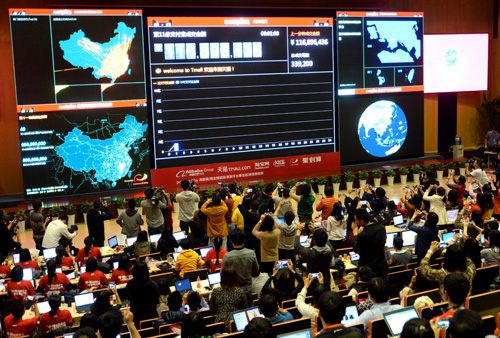

Before sunrise on November 11, Shi Hailin and his girlfriend sat waiting in front of their computer ready to grab bargain electronic appliances for their new apartment. When the shopping frenzy was over, they had spent more than 20,000 yuan ($3,280) and bought two air conditioners, a television, a refrigerator and a washing machine.
"The discounts offered by online stores are much more attractive. We saved 3,000 yuan ($492) at least by the online purchase that day," said Shi, a 30-year-old state-owned enterprise employee in Beijing.
|
 |
|
BUYING INTO SUCCESS: The transaction value of Alipay is shown on screen at the hall of Hangzhou-based Taobao headquarters in the early morning of November 11. |
On November 11, selected as China's premier online bargain shopping day and named Singles Day because of all the number 1's in the date's permutation, the country's e-commerce giant Alibaba created yet another annual buying bonanza record. In the process its business-to-customer (B2C) website Tmall and customer-to-customer (C2C) website Taobao raked in a total of 35.02 billion yuan ($5.75 billion) via an unprecedented slashing of prices across a vast range of goods.
On Singles Day in 2012, Alibaba saw sales of 19.1 billion yuan ($3.13 billion).
Over the past five years, besides Alibaba, a cluster of e-commerce companies like 360buy.com, the country's second largest B2C website, suning.com, the online platform of China's largest electrical appliance retailer, and amazon.cn, China operation of Amazon, have also joined forces in Singles Day online promotions.
New trends
Li Shengkai, a 40-year-old civil servant in Kaifeng, Henan province, spent about 20 percent of her clothing budget on Singles Day.
"I was browsing on the Internet all the day with my smartphone, and spent roughly 1,000 yuan ($164). Before the massive promotion, I went to shopping malls to try on the clothes I'd like to buy, and then bought them on Tmall.com at half price," said Li.
Placing orders with smartphones has become a general trend since the popularization of the devices in 2010, said Wu Yongming, vice president of Alibaba.
During this year's Singles Day, the mobile phone app of Alipay, a third-party online payment platform of Alibaba, saw a transaction value of 5.35 billion yuan ($877.9 million) with 127 million active mobile phone users buying online, up 460 percent year on year.
On that day, B2C website 360buy.com also saw its transaction value exceed 10 billion yuan ($1.64 billion), up 300 percent year on year, according to Lan Ye, its chief marketing officer. Among the 6.8 million orders, 1 million were placed via mobile phones.
The online-to-offline (O2O) system was also promoted on a large scale this year. Consumers select products in physical retail stores and place orders online. Such an interactive promotion system helped some e-commerce players achieve mega results. Take Suning for example. The home appliance giant integrates its e-commerce platform with its 1,600 brick-and-mortar stores. Three days before November 11, a total of 6 million orders were placed and 10 billion orders were placed on Singles Day with a transaction value of 7 billion yuan ($1.15 billion), equivalent to the sales of a quarter.
 Largest span timber arch bridge
Largest span timber arch bridge
 Porsche 911 Turbo S Asian premiere fascinates Auto Guangzhou
Porsche 911 Turbo S Asian premiere fascinates Auto Guangzhou
 Auto Guangzhou witnesses new Porsche sports cars Asia Premiere
Auto Guangzhou witnesses new Porsche sports cars Asia Premiere
 2013 Guangzhou auto show carmakers' eventers
2013 Guangzhou auto show carmakers' eventers
 Models at Volvo pavilion at 2013 Guangzhou auto show
Models at Volvo pavilion at 2013 Guangzhou auto show
 Lexus new hybrid hatch CT200h world premiere in Guangzhou
Lexus new hybrid hatch CT200h world premiere in Guangzhou
 New C-X17 showcases Jaguar's crossover concept
New C-X17 showcases Jaguar's crossover concept
 Acura all-new 2014 MDX comes to China
Acura all-new 2014 MDX comes to China